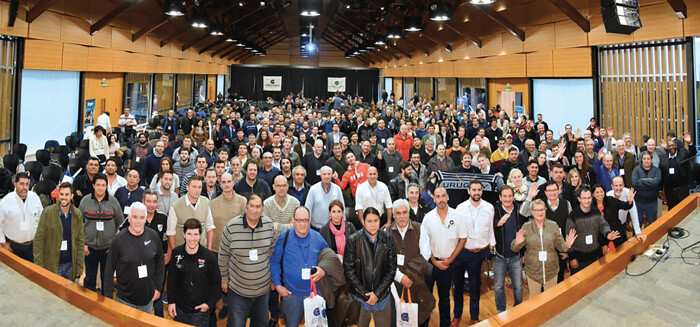
BUENOS AIRES, Argentina – The 22nd 'Jornadas Chemotecnica' event concluded successfully on May 28th at the Catholic University in Puerto Madero, Buenos Aires, Argentina. The two-day event brought together 786 pest control professionals, demonstrating significant domestic and international interest in Argentina's pest control industry. A total of 20 exhibition booths were operated, with several major suppliers participating to showcase the latest industry trends and technologies.
Argentina at a Turning Point, Embracing New Opportunities
Guillermo Tarelli, Business Manager at Chemotecnica, the event's organizer, emphasized that "this event took place at a crucial turning point for Argentina." He explained that Argentina is entering a new phase, moving away from years of closed border policies towards openness to international investment, updated regulatory frameworks, and enhanced competitiveness. These changes are expected to present enormous opportunities for the pest control industry. With a population of 45 million and a robust educational foundation, Argentina boasts the second-largest economy in Latin America, emerging as a prominent country as global companies look to expand into the Latin American market.
The dedicated efforts of the Chemotecnica team are credited with making this event a leading fixture in Argentina's pest control industry. 'Jornadas Chemotecnica,' with its long history and tradition, has established itself as Latin America's largest pest control exhibition, with over 1,000 professionals attending its 16th edition in 2019. Such events serve as crucial platforms not only for showcasing products and technologies but also for industry professionals to share knowledge, collaborate, and explore avenues for progress.
Highlighting the Importance of Integrated Pest Management (IPM)
The conference agenda featured a seminar program and in-depth workshops covering a wide range of topics related to Integrated Pest Management (IPM). IPM is a comprehensive approach to solving pest problems that goes beyond simply relying on pesticides. It prioritizes understanding pest ecology, considering non-chemical control methods first, and using minimal chemical interventions only when necessary. These discussions illuminated both the current challenges and future potential of the Argentine market, showcasing the vibrant development of the pest control industry.
Argentina's pest control industry has experienced rapid growth in recent years. This is attributed to a combination of factors, including accelerated urbanization, intensified pest problems due to rising temperatures, and increased pesticide resistance in pests. Major pests include cockroaches, rodents, and ants, and in the agricultural sector, pest and weed management is particularly critical. Argentina is the world's third-largest consumer of pesticides, with usage more than tripling over the past 25 years, consistently raising concerns about environmental and human health impacts.
Challenges and Opportunities in Argentina's Pest Control Industry
Currently, Argentina's pest control market is active and competitive, with major players like Gleba, Envu, and Chemotecnica. However, Argentina's unstable economic situation, marked by high inflation rates and public debt, could pose a potential obstacle to industry growth. Indeed, multinational corporations have faced economic difficulties; for example, the Swiss agrochemical company Syngenta withdrew from the Argentine market in 2015 and ceased product imports in 2021.
Nevertheless, optimism for economic stabilization has grown since the election of President Javier Milei, leading to positive signs in the market. The stock market has surged by 14%, and shares of the state-owned oil company YPF have risen by over 34%, reflecting widespread market optimism. The agricultural sector, a key driver of Argentina's economy, is also expected to see increased production and exports through policy reforms under the Milei administration. This is anticipated to have a positive impact on the pest control industry.
Furthermore, with the increasing use of drones for pesticide application in Argentina, issues related to regulation and safety have become pressing concerns. Feasibility and quality tests for drone application technology have been conducted since July 2023, and within just one year, the use of drones by farmers for applying plant protection products has surged. While this contributes to increased agricultural productivity, it also raises concerns about pesticide drift and health risks for nearby residents. The adoption of sustainable control technologies like Integrated Pest Management (IPM), coupled with the development of technologies for accurate and safe chemical application and the establishment of appropriate regulations, is urgently needed.
The 'Jornadas Chemotecnica' event served as a crucial platform for exploring the direction the pest control industry should take amidst Argentina's changing social and economic environment. Industry professionals must strive to achieve the dual goals of solving pest problems and protecting the environment through continuous research and development and the adoption of innovative technologies.
[Copyright (c) Global Economic Times. All Rights Reserved.]






























